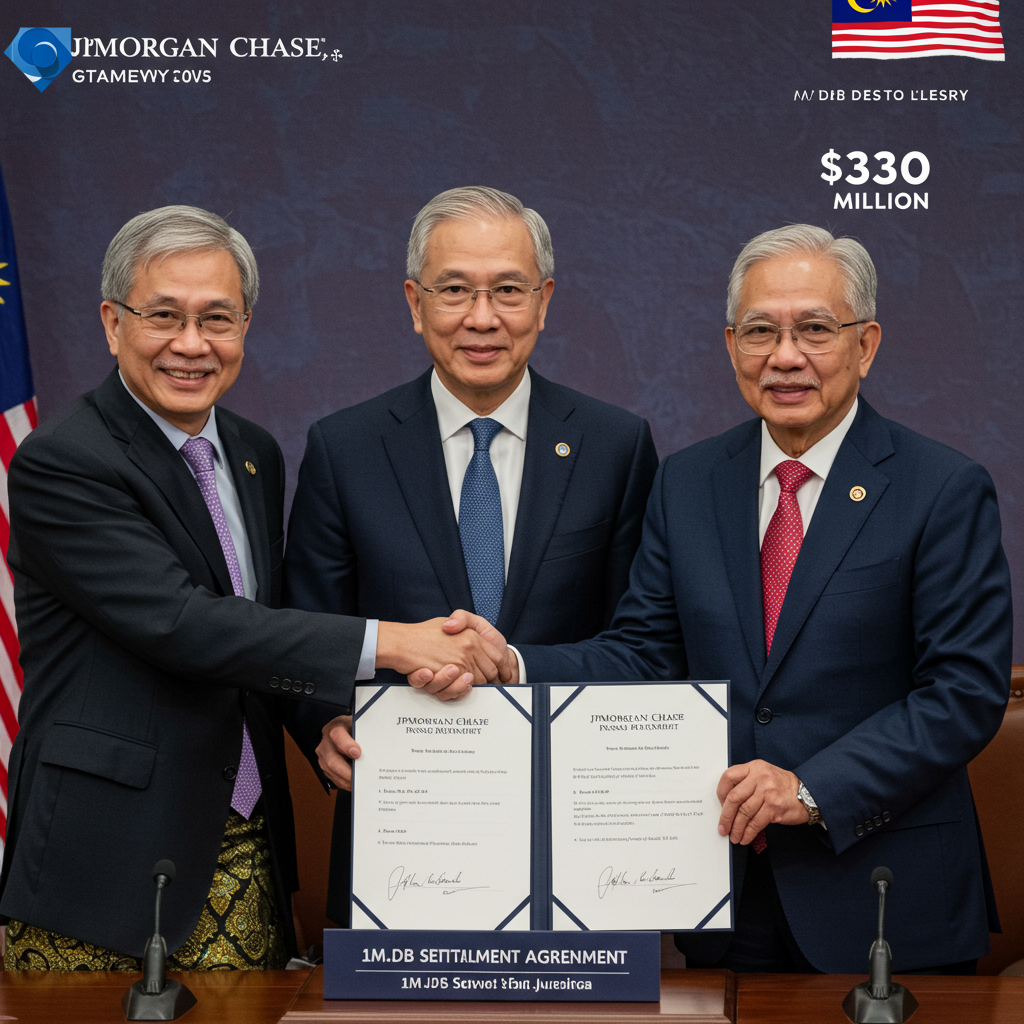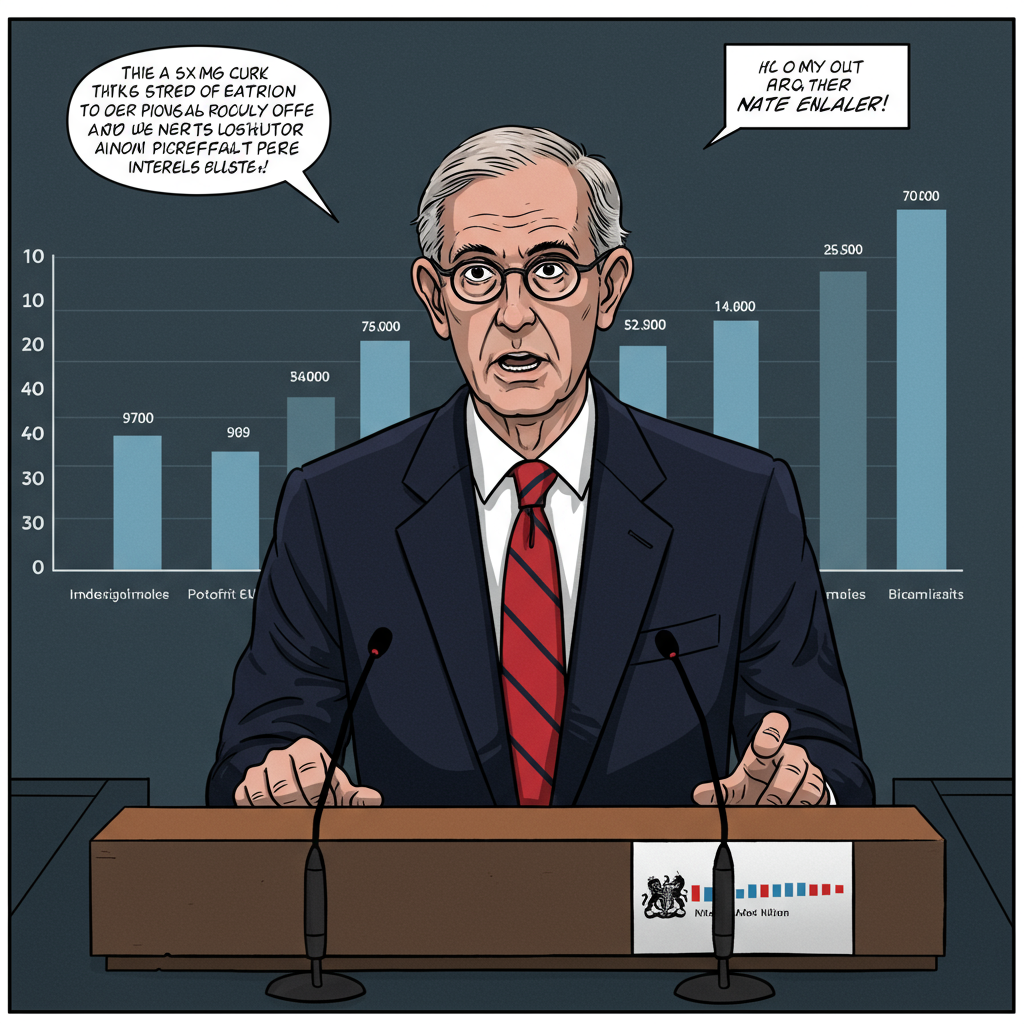JPMorgan Chase has agreed to a significant $330 million settlement with Malaysia, resolving all long-standing legal disputes tied to the infamous 1MDB scandal. This substantial payment concludes years of international legal battles and allegations that the bank’s Swiss division played a role in facilitating the theft of billions from Malaysia’s government investment fund. The settlement, announced after extensive negotiations, signals a “legal truce” and aims to bring a measure of finality to JPMorgan’s direct involvement in one of the most audacious financial frauds in recent history.
For those tracking global financial markets and regulatory enforcement, this development is a critical marker. The funds from this JPMorgan 1MDB settlement will directly bolster Malaysia’s Assets Recovery Trust Account, dedicated to reclaiming the vast sums siphoned from the sovereign fund. While JPMorgan resolved the matter without admitting guilt, this agreement underscores the severe consequences financial institutions face when their anti-money laundering (AML) safeguards falter. It also highlights the relentless pursuit of justice by the Malaysian government in its quest to recover misappropriated national wealth.
Unpacking the $330 Million JPMorgan 1MDB Settlement
The agreement means Malaysia will withdraw all current lawsuits against JPMorgan, including specific claims against its Swiss subsidiary. Both parties have committed to not pursuing any future legal action related to the 1MDB affair. This move establishes a clear path forward, ending the uncertainty that surrounded JPMorgan’s potential liabilities in Malaysia. A joint statement from the Malaysian government and the bank confirmed this mutual commitment, binding both from any future claims or litigations.
This JPMorgan 1MDB settlement follows a pattern seen with other major financial institutions implicated in the scandal. However, unlike some, JPMorgan has maintained its stance of no wrongdoing. A bank representative emphasized its commitment to the highest operational standards. They acknowledged that issues are addressed directly when they arise. The bank also expressed appreciation for its collaboration with the Malaysian Government. It affirmed that its controls have significantly enhanced since the incidents, aiming to earn the trust of regulators.
JPMorgan’s Alleged Role and AML Failures
Allegations against JPMorgan emerged from a lawsuit filed by Malaysian officials in 2021. The suit specifically accused the bank’s Swiss operations of processing approximately $800 million in suspicious transfers. These funds allegedly moved from the 1MDB state fund to a fraudulent business partnership. This legal action was a key part of Malaysia’s broader offensive. It targeted various financial institutions and individuals linked to the massive fraud.
Swiss authorities had previously imposed a penalty on JPMorgan. They fined the bank $3.7 million for inadequate anti-money laundering (AML) safeguards. This was specifically during 2014 and 2015. Prosecutors stated that JPMorgan processed 43 questionable fund transfers. These transfers totaled around $214 million. The bank allegedly failed to scrutinize these suspicious activities properly. Investigators concluded that JPMorgan did not adequately investigate its business relationships with PetroSaudi. This was despite publicly available information suggesting the venture’s managers were involved in the 1MDB theft. These regulatory findings likely accelerated the drive towards a settlement.
The Global Echoes of the 1MDB Scandal
The 1MDB scandal is widely characterized as international financial corruption on an unprecedented scale. Beginning in 2009, investigators estimate at least $4.5 billion was siphoned from the fund. This illicit money flowed through major global financial hubs. It implicated various prominent banks in the process. Businessman Jho Low and his network are alleged to have masterminded the complex scheme. They persuaded Malaysian leadership and fund managers with promises of lucrative investment opportunities and high returns.
The fraud only came to light years later. Investigative journalism by The Wall Street Journal exposed how funds were routed through JPMorgan’s Swiss operations. They were often disguised as legitimate energy transactions. These were supposedly backed by the Saudi government. The stolen 1MDB money financed an extravagant spending spree globally. This included high-end real estate purchases, valuable artwork, and luxury yachts. It even provided backing for the Hollywood production “The Wolf of Wall Street.” The sheer audacity and scope of this financial fraud sent shockwaves across the globe.
Other Major Players and Lingering Questions
JPMorgan’s legal troubles represent just one facet of the sprawling 1MDB investigation. This intricate web of deceit has implicated multiple major financial institutions. Goldman Sachs, for example, faced the heaviest financial consequences. It settled for over $5 billion across various jurisdictions. Its Malaysian subsidiary even pleaded guilty to violating federal anti-bribery statutes. Goldman executives also received prison sentences for their involvement. They utilized elaborate documentation and offshore shell entities to conceal the movement of stolen funds.
Key figures in the scandal have also faced severe repercussions. Malaysia’s former leader, Najib Razak, was convicted on multiple charges. These included money laundering, power abuse, and breach of fiduciary duty. In Switzerland, two executives who ran the fake 1MDB PetroSaudi venture were convicted last year. They faced charges including fraud, criminal mismanagement, and money laundering. However, the alleged chief architect, fugitive financier Jho Low, remains at large. International law enforcement agencies are actively pursuing him. The ongoing efforts demonstrate the global commitment to tackling financial crime.
Malaysia’s Relentless Asset Recovery Mission
For Malaysia, the JPMorgan 1MDB settlement marks another successful step in its ongoing mission. The nation is tirelessly working to recover the billions lost to the scandal. This recovery adds to a series of international successes. These efforts have significantly contributed to a sense of closure surrounding one of the past decade’s most far-reaching financial scandals. Yet, broader questions about bank accountability in such large-scale frauds continue to spark debate.
The recovery of these funds is crucial for Malaysia’s economy and public trust. The government has prioritized bringing those responsible to justice. It also seeks to reclaim stolen national assets. This settlement sends a strong message to financial institutions worldwide. Banks must uphold rigorous anti-money laundering standards. They must conduct thorough due diligence. Failing to do so carries significant financial and reputational risks. The implications extend far beyond a single fine; they reshape how global finance operates.
Lessons in Compliance and Corporate Responsibility
The JPMorgan 1MDB settlement offers vital lessons for the entire banking industry. It underscores the critical importance of robust compliance frameworks. Financial institutions must implement comprehensive AML systems. These systems must detect and report suspicious transactions effectively. The case highlights how lapses in these controls can have catastrophic consequences. These include massive financial penalties and severe reputational damage.
Banks are under increasing pressure from regulators globally. They must enhance their monitoring capabilities. They also need to strengthen their internal controls. The 1MDB scandal serves as a stark reminder. Financial institutions are gatekeepers of the global financial system. They have a responsibility to prevent illicit funds from flowing through their networks. This incident emphasizes that diligence and integrity are non-negotiable in modern finance.
Frequently Asked Questions
What is the 1MDB scandal, and why is it significant?
The 1MDB scandal represents one of the largest financial frauds in history. Between 2009 and 2014, an estimated $4.5 billion was siphoned from Malaysia’s state-owned investment fund, 1Malaysia Development Berhad (1MDB). The money was used for lavish personal spending, real estate, and even Hollywood film financing. Its significance lies in its global reach, implicating major financial institutions, high-ranking officials, and demonstrating profound failures in international anti-money laundering systems.
What were the specific allegations against JPMorgan in the 1MDB case?
JPMorgan Chase’s Swiss division faced accusations of facilitating the theft of billions. Specifically, Malaysian officials alleged that the bank processed approximately $800 million in suspicious transfers from 1MDB to a fraudulent business partnership. Swiss authorities also fined JPMorgan $3.7 million for inadequate anti-money laundering (AML) safeguards during 2014-2015, citing 43 questionable fund transfers totaling around $214 million that lacked proper scrutiny, particularly involving the firm PetroSaudi.
What are the broader implications of the JPMorgan 1MDB settlement for the banking industry?
This $330 million settlement reinforces the critical need for robust anti-money laundering (AML) and compliance frameworks within financial institutions. It sends a clear message that banks failing to uphold rigorous due diligence and oversight will face substantial financial penalties and reputational damage. The case highlights the role of banks as gatekeepers against illicit financial flows and underscores the continuous global regulatory pressure to enhance internal controls and strengthen anti-financial crime measures.
Conclusion: A Step Towards Financial Integrity
The JPMorgan 1MDB settlement is more than just a financial transaction. It represents a significant step forward in Malaysia’s arduous journey to reclaim what was lost. It also serves as a potent reminder to the global financial industry. Vigilance, robust compliance, and ethical conduct are paramount. While JPMorgan resolved the matter without admitting wrongdoing, its commitment to enhancing controls speaks volumes about the lessons learned.
This settlement closes a chapter for JPMorgan in the protracted 1MDB saga. However, the wider implications for financial integrity and corporate responsibility resonate deeply. As global financial systems become more complex, the need for transparent, accountable, and diligently managed institutions grows ever stronger. The pursuit of justice for victims of financial fraud will continue, ensuring that such large-scale illicit activities are met with unwavering international resolve.



